Writing dialogues for the Clean Spear tavern - Roadwarden Devlog
The Clean Spear tavern is the first major settlement the can be visited in Roadwarden. “Can be”, but doesn’t “have to be”. While Spear is going to be related to various side-quests and may be a significant part of the experience, the player doesn’t have to visit this place to see the resolution of the “main” story.
When the game’s tutorial ends, the PC approaches a crossroad. The western road leads is more “tamed”, focused on interacting with people, participating in side quests and gathering rumors. The eastern road is much wilder - more challenging, focused on exploration, stranger. The unknown.
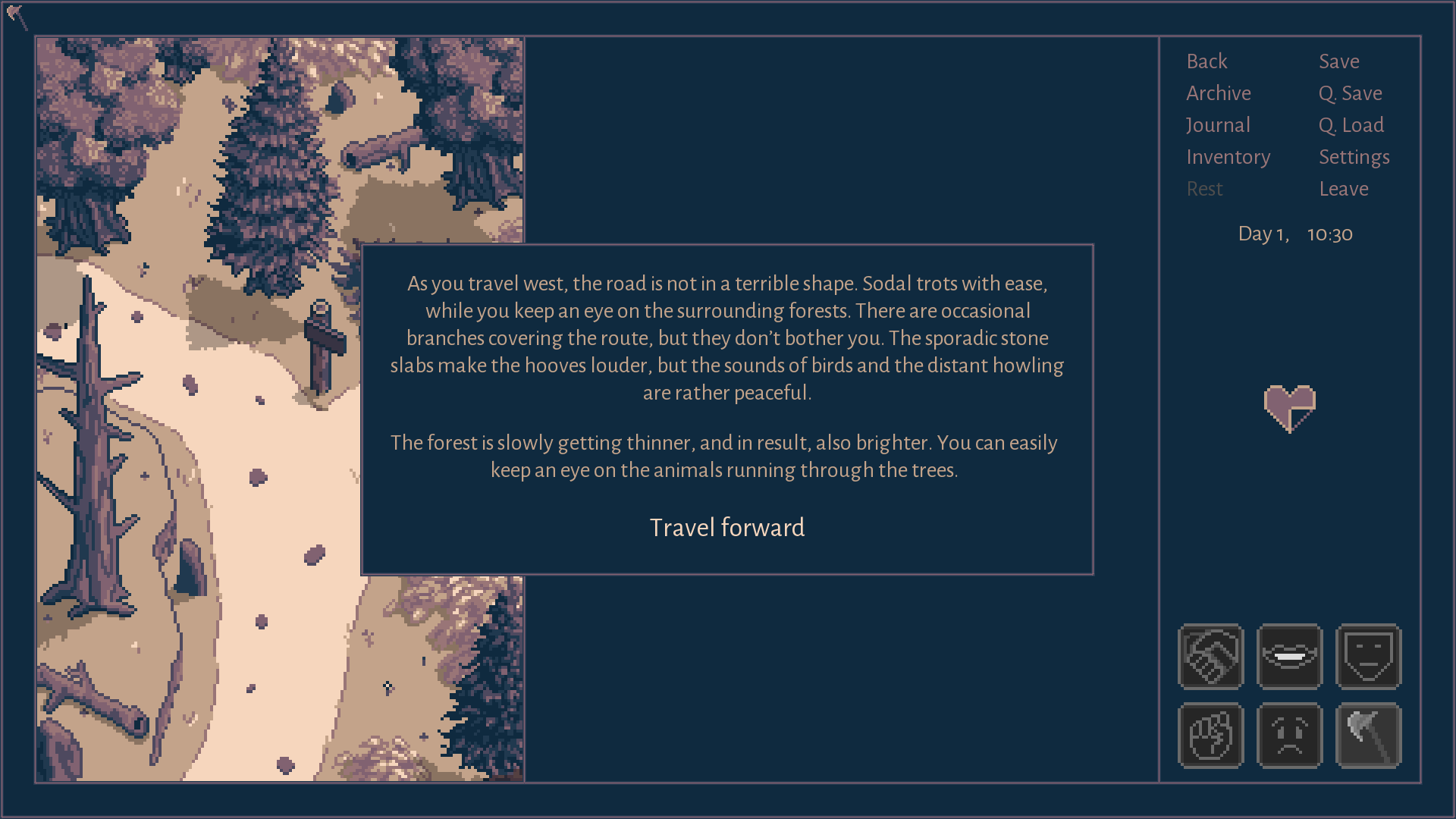
Clean Spear is the first area placed to the west, and it plays an important role in the game. It’s introduced when the player knows the majority of the game’s mechanics, but isn’t sure yet how it’s structure is going to look like. “How much can I really do here,” they may ask.
So while most of the areas introduce just a bunch of possible interactions at once, the Clean Spear plays the role that in other RPGs is filled by the first town, or the first village. It allows you to participate in a couple of activities at once, without focusing too much on any of them in particular.
In this devlog, I’m going to present how it works. And what decisions have I made to build it this way.
Just to be sure - the tavern is not fully written just yet. For example, you can unlock a quest, but there are no hidden lines of code that already include all the dialogue chunks related to completing it. For now, I’m focusing on the first contact - what you will find here before you go further west.
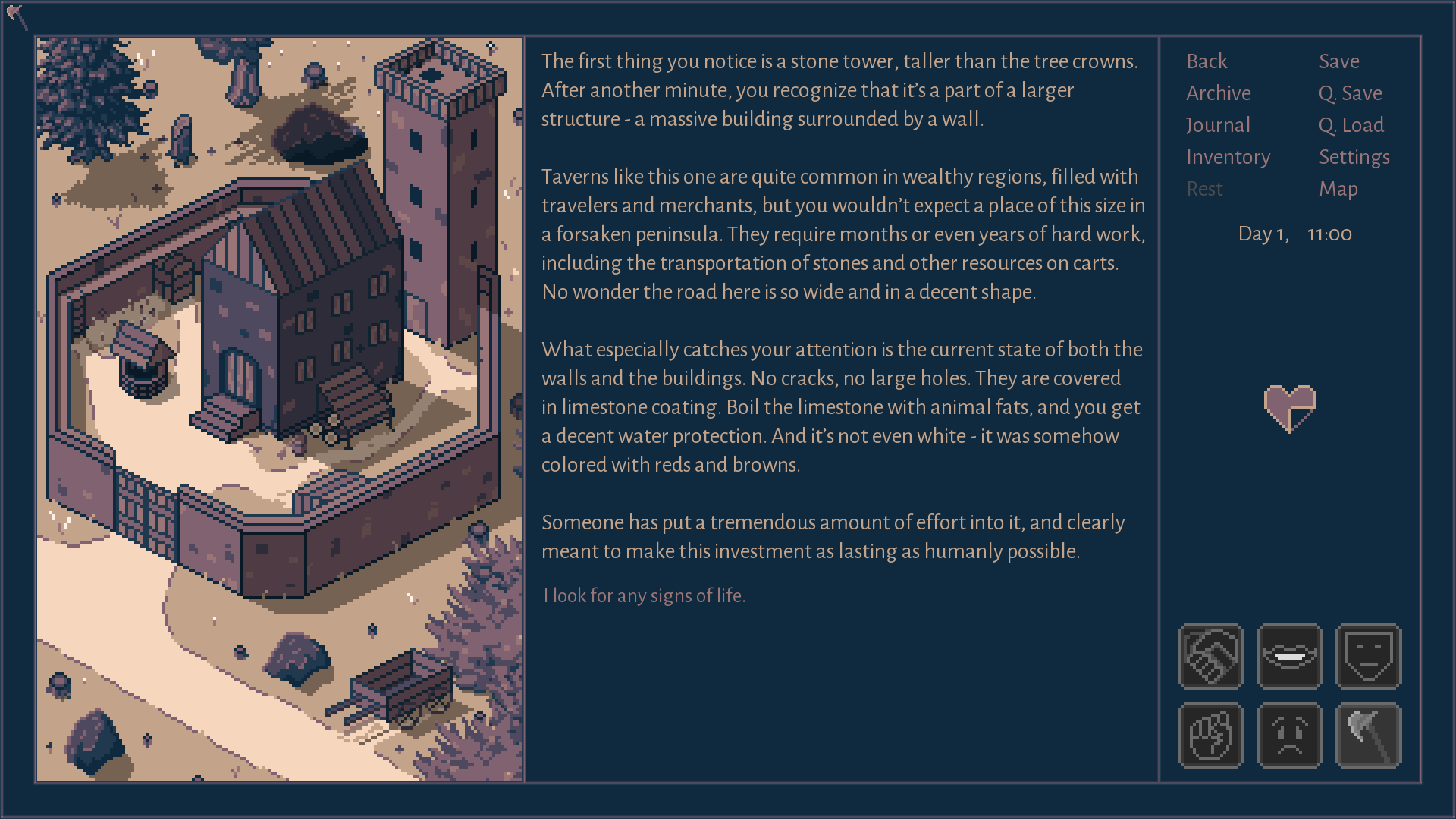
It’s always difficult, especially in fantasy fiction, to measure the appropriate amount of worldbuilding presented through narration. Ideally, you want to give the player all the necessary information, but also - not more than that. And you have to make it as camouflaged as possible, build a narration that makes the dry facts palatable. So, the tavern is not just “big, has cost a fortune and you don’t know who could want to place it here, against all odds.” All these information are not just told, they’re shown.
When you arrive to a new place in Roadwarden, your character doesn’t ignore it. A part of the main story is that the PC has to explore the strange peninsula, and understand what and who is there to be found. I “could” add options such as “I don’t care, I just ride ahead” and allow the player to ride through the entire realm with as few mouse clicks as possible. I just find no value in it. It’s not a sandbox game, you’re not going to have a drunken “killing all NPCs” run anyway.
I assume that you’ve arrived to a new place to experience it. That exploring it is pretty much essential for the dramatic structure of the game, and you won’t try to avoid it.
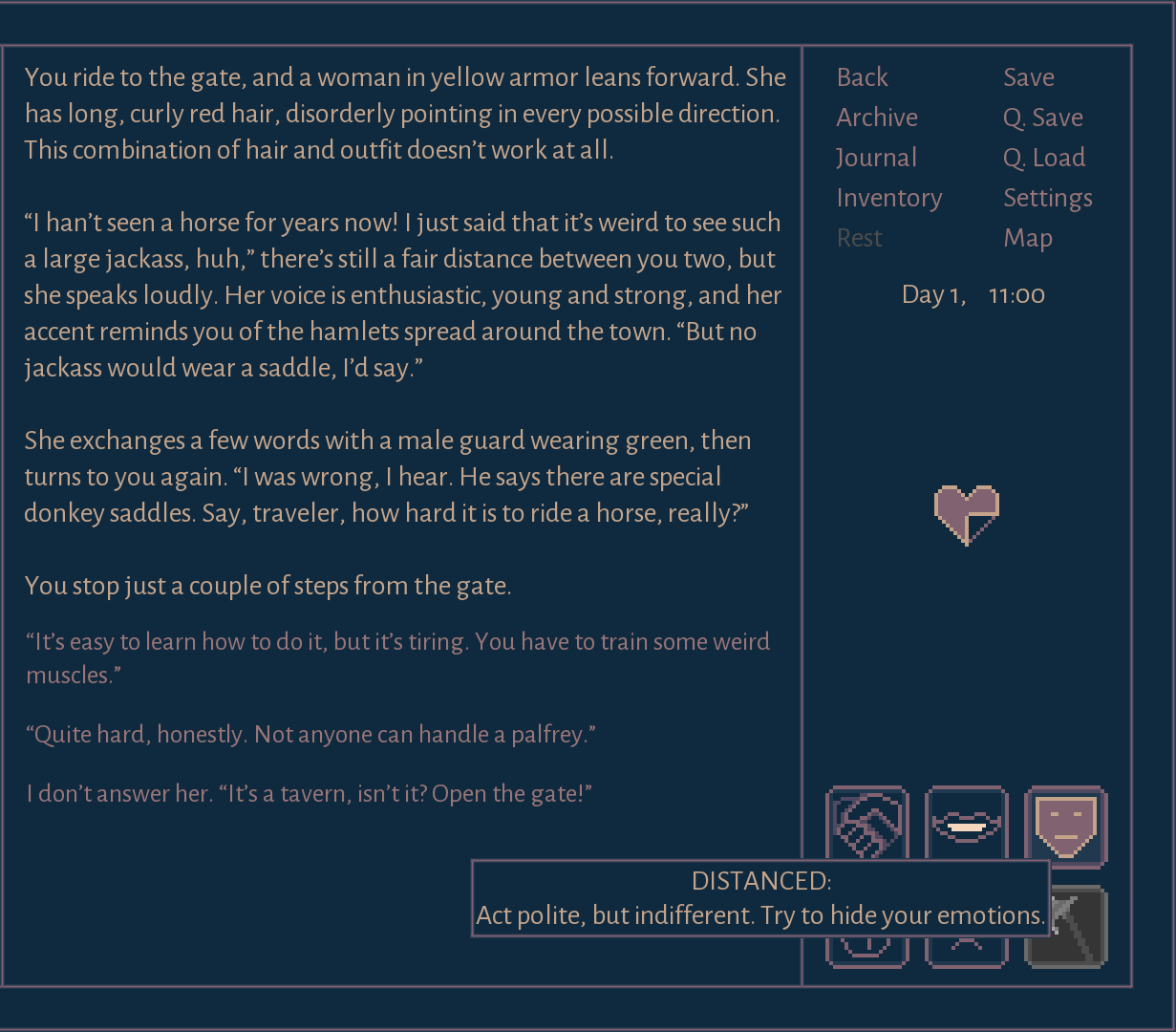
To support the illusion that the other characters in the game have their own motivations, it’s the NPCs who speak with you first. One of the guards wants to use this opportunity to enjoy a bit of a small talk. She is kind, even goofy.
You can respond in a couple of ways by matching a dialogue option with one of the five Attitudes (Friendly, Playful, Distanced, Intimidating, Vulnerable). I see Attitudes as masks you use to influence how others see you.
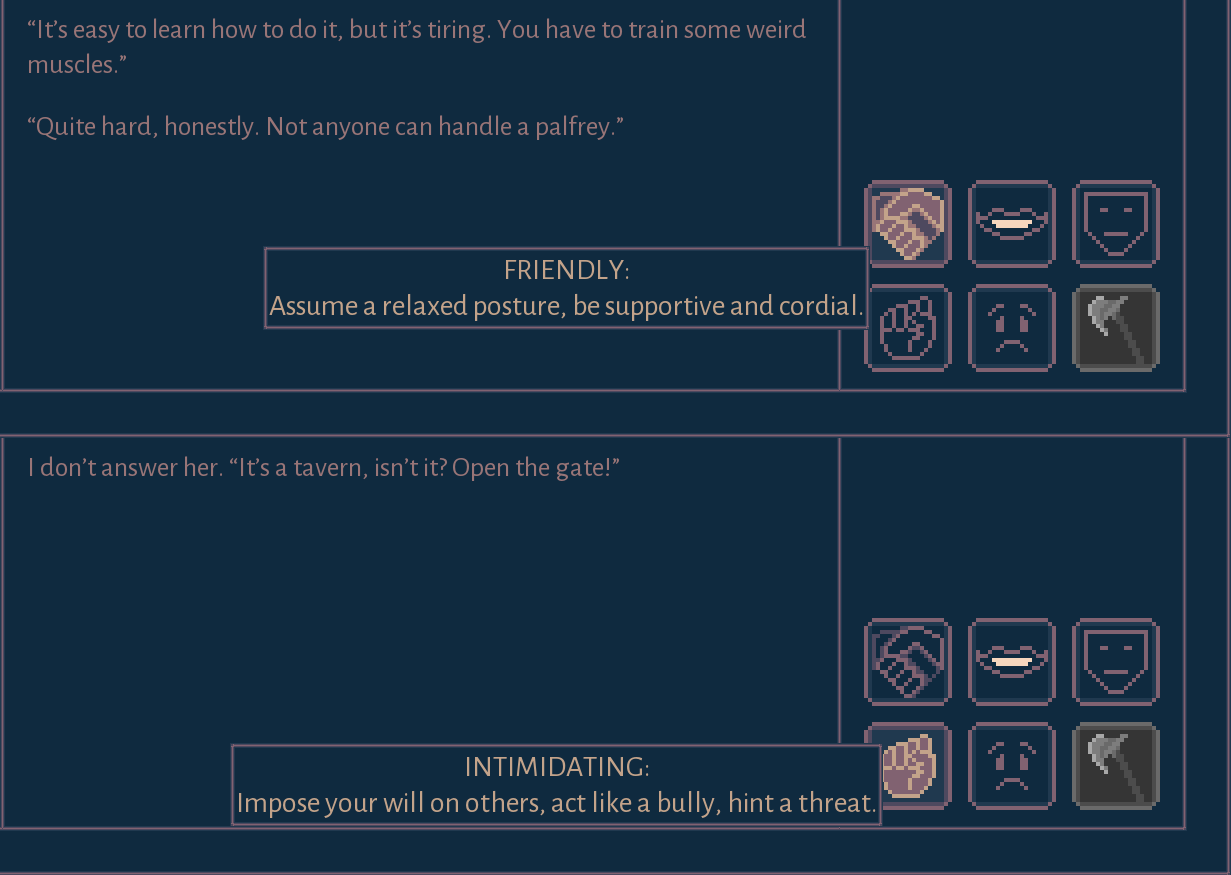
Two of the dialogue options are almost identical:
“It’s easy to learn how to do it, but it’s tiring. You have to train some weird muscles.”
and
“Quite hard, honestly. Not anyone can handle a palfrey.”
These two choices provide some small differences in the way NPCs react to your comments, but they’re not here to make one of these choices more “profitable” for the player. They’re meant to give you an opportunity to express your character. Is it trying to stay somewhat humble and even encouraging, or do you portray it as a strong person with a unique set of abilities - which is possibly more honest?
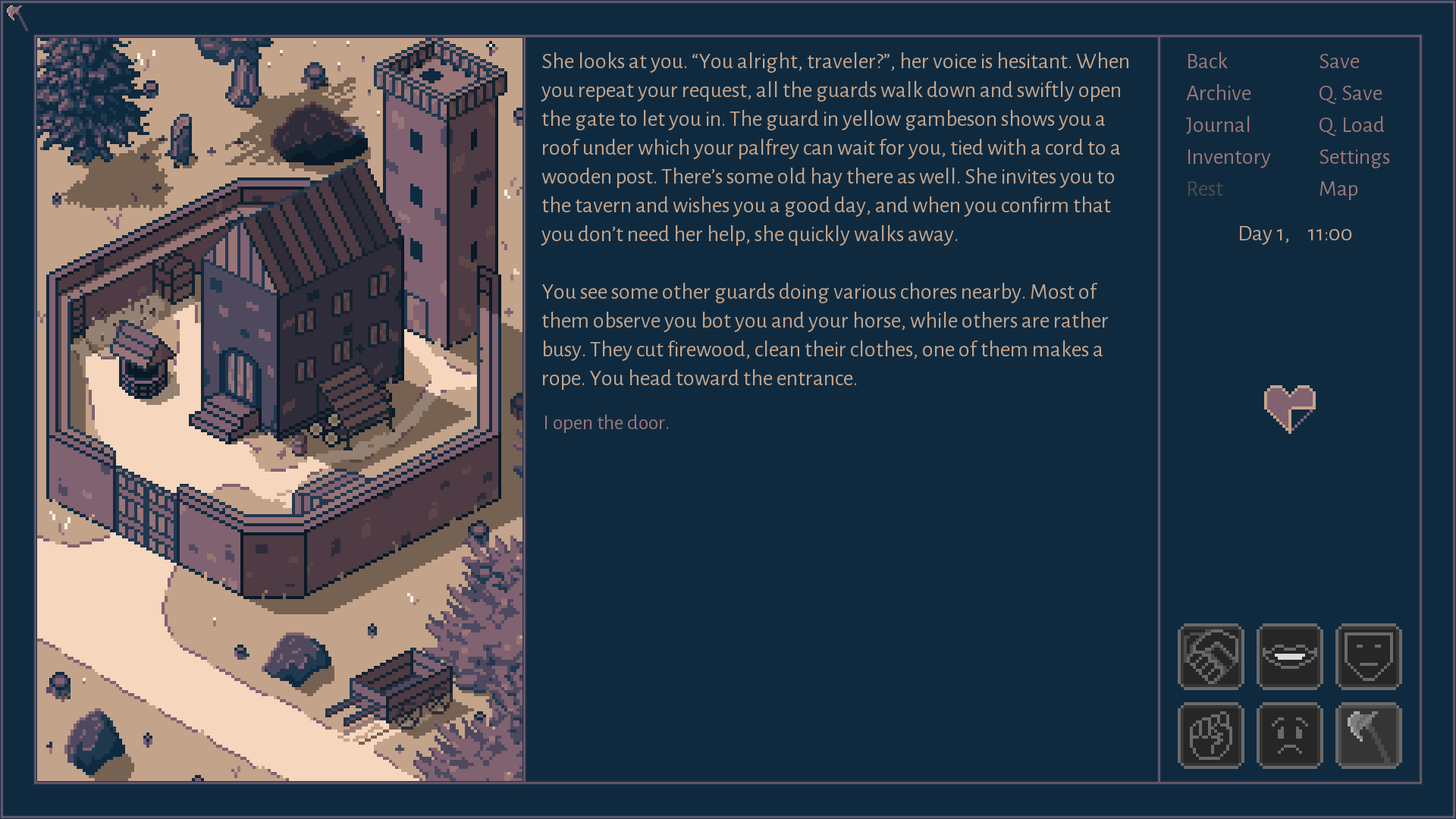
The real difference here makes the Attitude you use while selecting one of these options. Attitudes can be chosen only at the beginning of the conversation and they mostly impact the first impression you make. Various combinations lead to slightly different answers and change the mood of your interaction with the guards. If you are either Friendly or Playful, the guards become more affable (and the game stores this information for later). And if you are Distanced or Vulnerable, they also stay rather neutral.
However, if you choose:
Intimidating: I don’t answer her. “It’s a tavern, isn’t it? Open the gate!”
...it will reduce the level of friendliness.
Currently, you can’t talk with the guards outside of this introduction, but it’s a thing I definitely want to add later on. An option to sit down with them and talk about one thing or another. It just wasn’t that important at this stage of the game’s development. And the level of your friendliness will modify such conversations.
This interaction is not extremely significant from the perspective of the game’s mechanics. That’s why you make the choice basing it mostly on your whim and judgment - the NPC is very open and kind, so you may want to respond in the same manner.
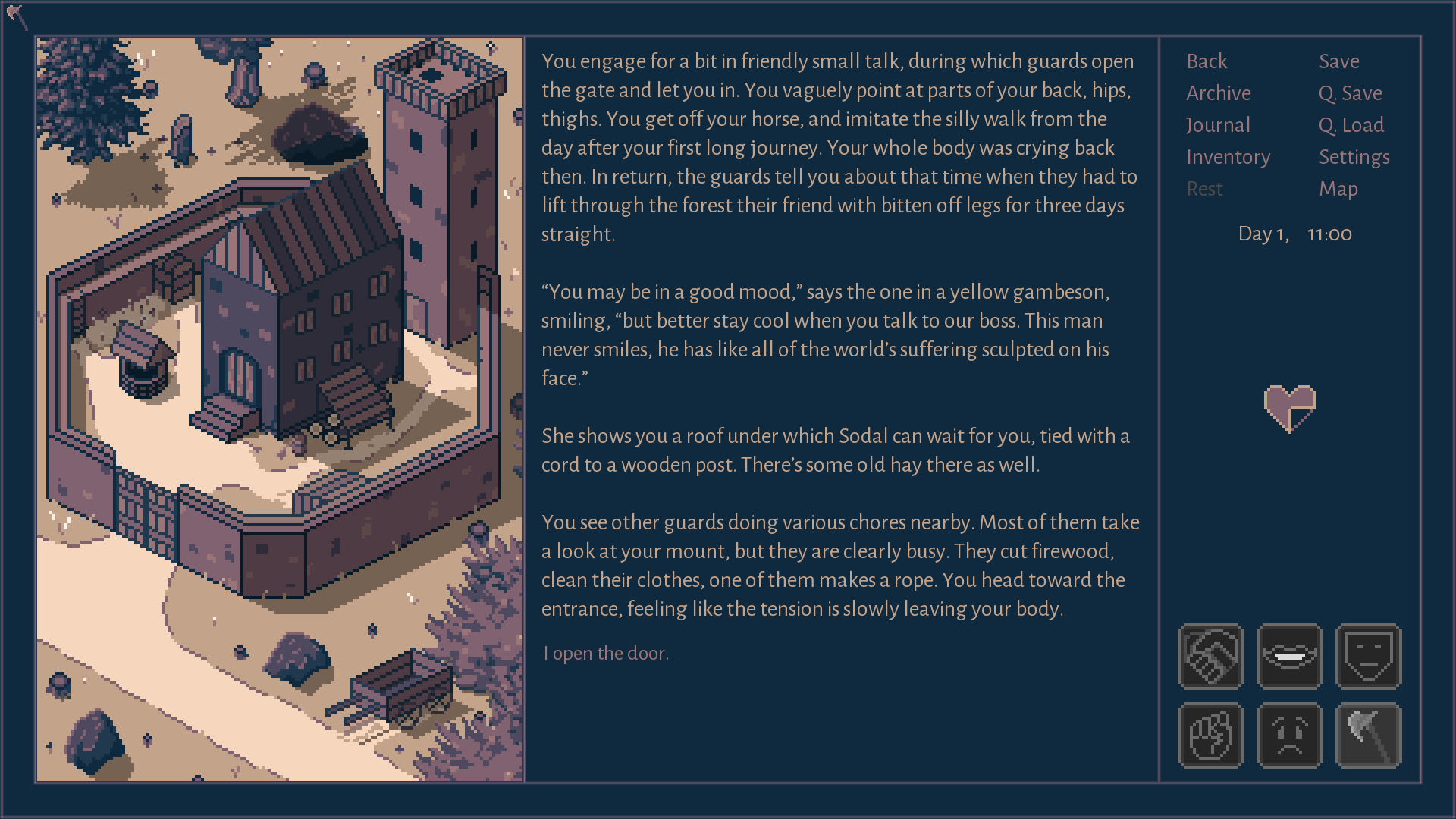
However, in more significant parts of the game, you shouldn’t be forced to always base your judgment on feelings alone, without the more specific information. You can gather news about other NPCs, find out what are they like and what can you expect from them. It’s an information that’s not purely based on luck and empathy, but also something that you find through exploration.
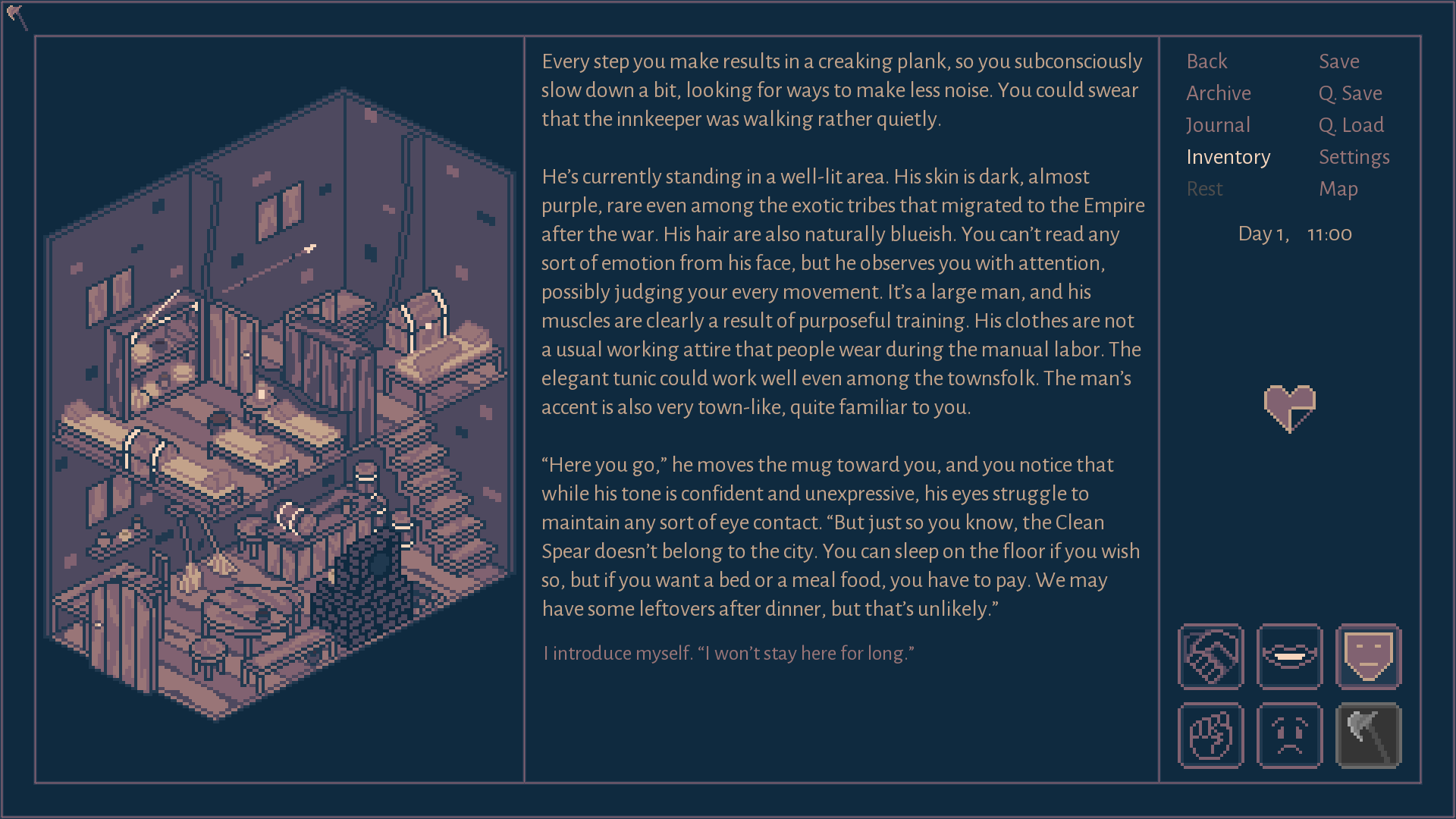
The innkeeper’s preferred Attitudes are more difficult to predict through the presented emotions alone. You can still play around and look for a “good” choice through trial and error, but you can find the information about the “optimal” Attitude in two places that you’ve previously seen.
Firstly, during the tutorial section you may find a clue here that the innkeeper likes professional, competent people - it’s suggested that you should stay “Distanced” around him. It’s an information that shows up only if you are asking questions, gathering intel. It rewards you for exploration.
The second source of the information was at the gate - if you’re either Friendly or Playful, the guard will mention that the “boss” isn’t one to make fun of. If you’re Intimidating, she will warn you to behave yourself around the innkeeper, or you’re going to regret it.
When you approach the innkeeper, every Attitude gives you a slightly different result, both narratively and mechanically. He has his own “friendliness” level, and here you can see how how it changes during the first encounter:
Friendly - new dialogue, friendliness is reduced by a level
Playful - same dialogue as Friendly, but friendliness is reduced by 2 levels instead of one
Distanced - new dialogue, friendliness is increased by a level
Intimidating - new route, friendliness is reduced by 2 levels. it also changes the displayed dialogue option into “Shut up and answer my questions. I’m in a hurry.”
Vulnerable - new dialogue, friendliness doesn’t change
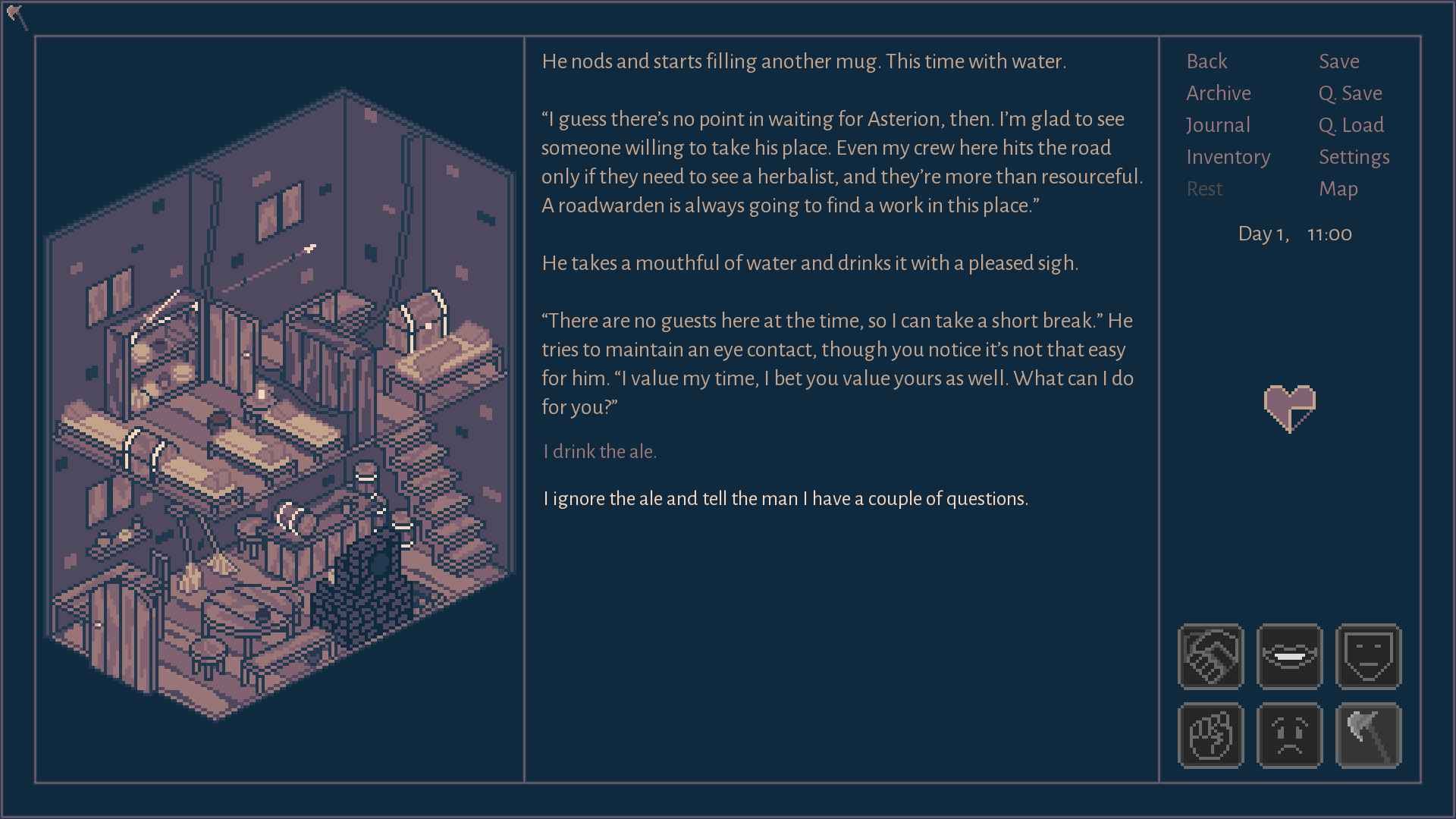
The regular "route” allows you to choose between drinking a free beer (what gives you a nice taste description) or ignore it. The game doesn’t imply why you may want to refuse a free round. Maybe you’re paranoid and afraid of poison, or you don’t want to display too much trust, or maybe you feel like playing a character that doesn’t believe in anything being “free”. It’s a small role-playing bit, without any gameplay-related effects.
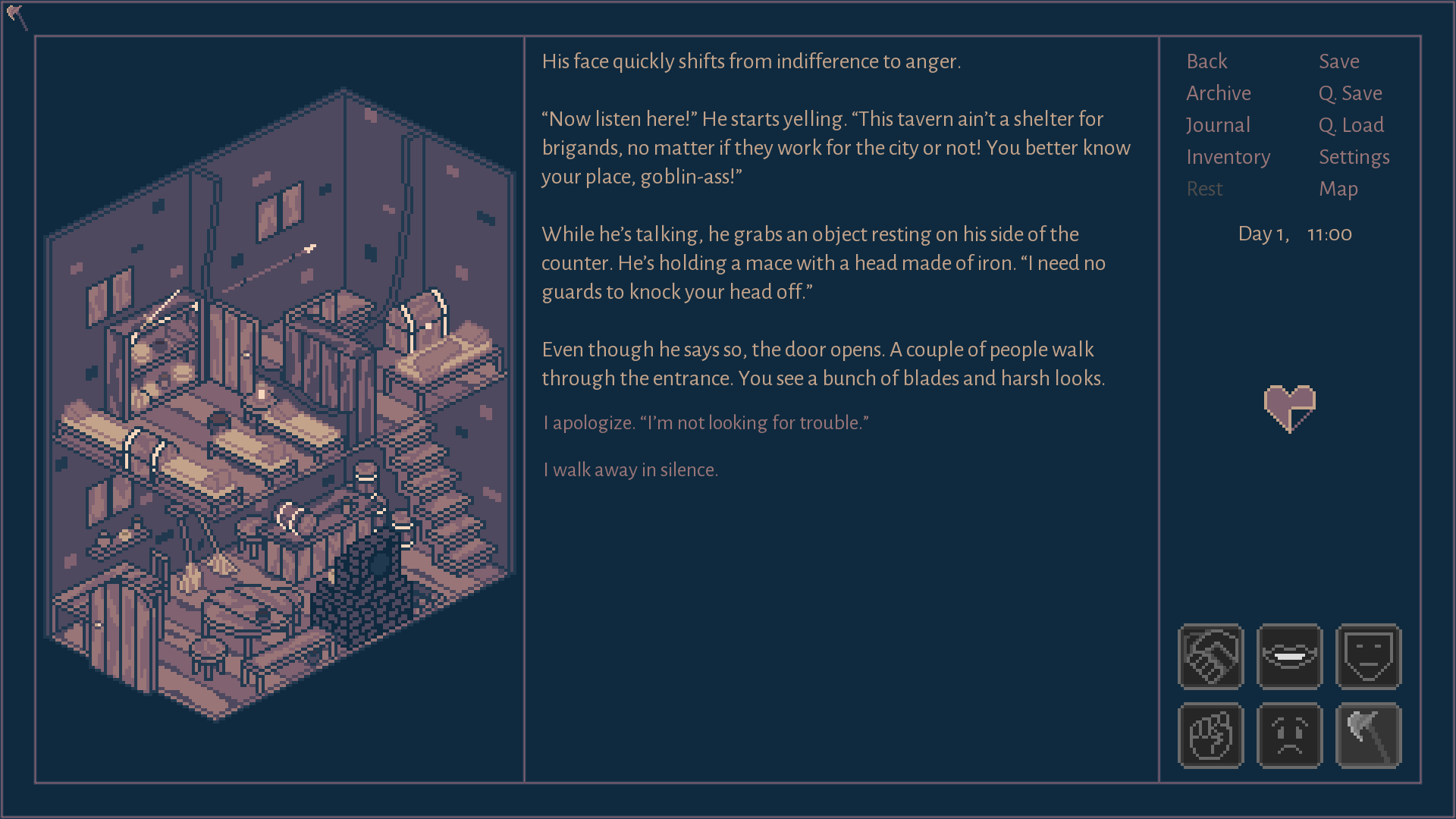
The Intimidating route, however, makes the innkeeper angry. He threatens you, and you can either apologize or act tough. Both of these choices are rather bad. The first one gives you a temporary tavern ban - you are forced to leave, but you can return one day later and have the regular conversations. The second choice gives you a seemingly permanent ban.
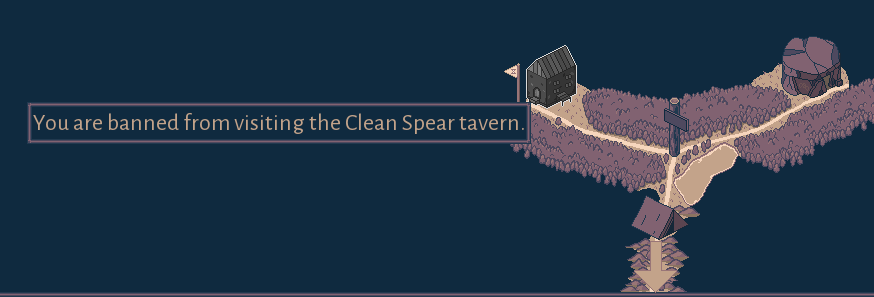
If you experience the temporary ban, you’re kicked out... Unless it’s already after sundown. In such case, you can stay. The atmosphere is cold and you’re pretty much forced to go to sleep, but at least you’re not thrown into wilderness (what would result in hurting your character). In case of a permaban - you’re kicked out no matter what.
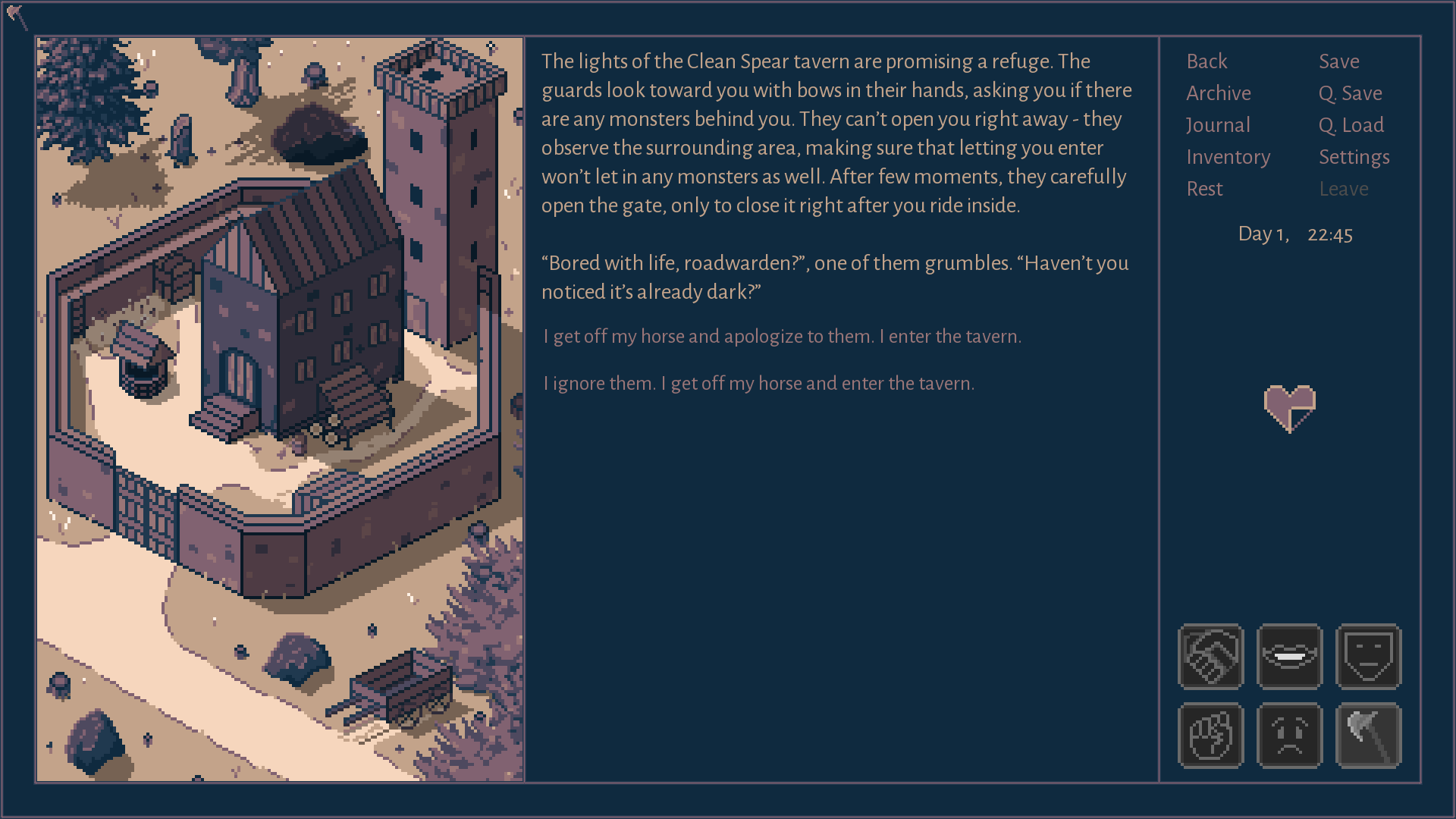
It’s not the only thing that changes depending on the time current time. After the first visit, if you arrive before 8 PM, you’ll see an open gate and the guards minding their own businesses - the specific description is partially randomized. If you arrive later on, the gate will be closed and the guards will be already on the walls. If you arrive in the middle of the night, the atmosphere of your arrival changes significantly.
But let’s get back to the regular tavern visit.
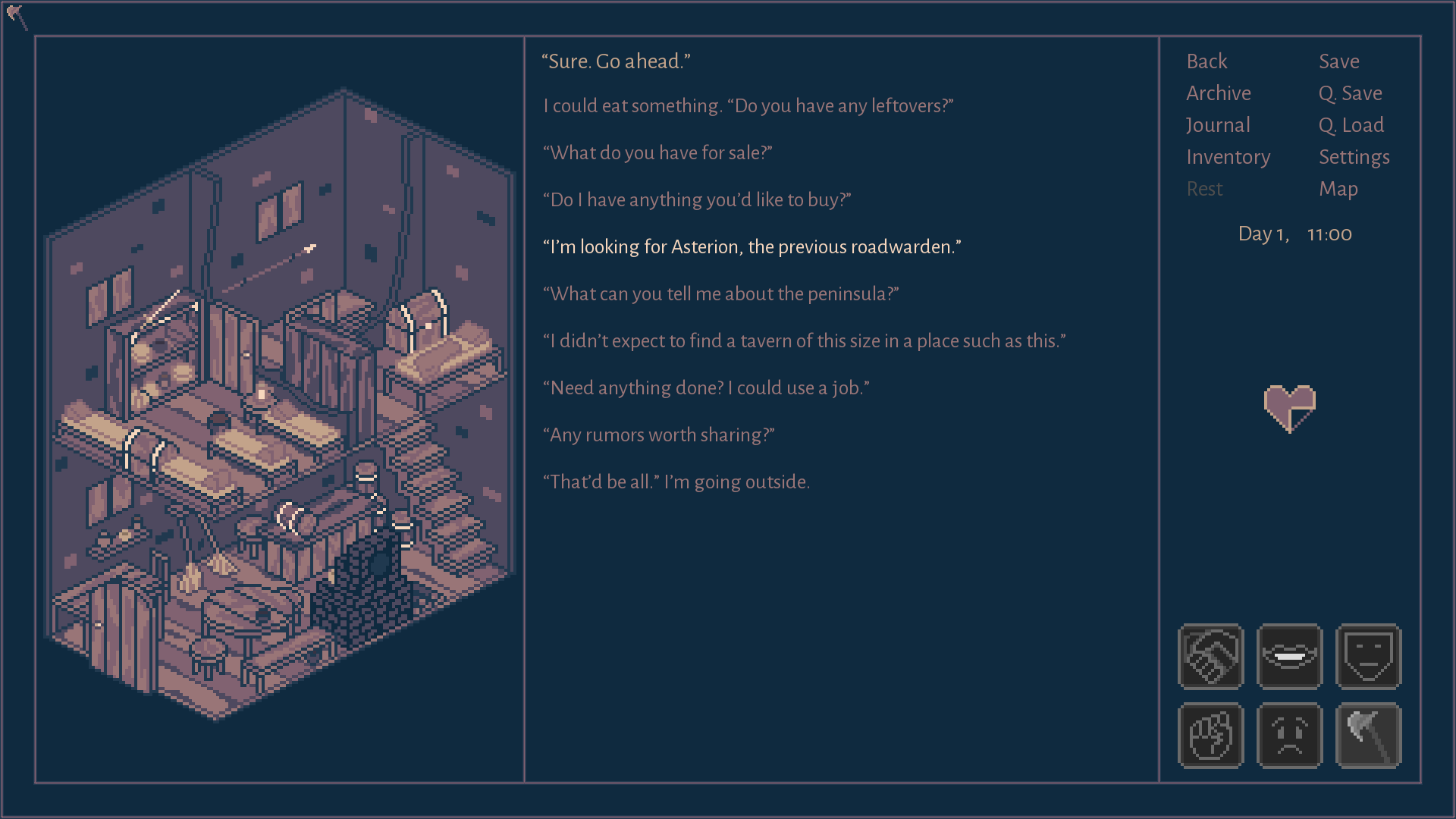
Some of the actions you make are very straight-forward. You get through a couple of chunks of dialogue, and you return to the main list of questions. Regular RPG stuff:
“I’m looking for Asterion, the previous roadwarden.”
“What can you tell me about the peninsula?”
“I didn’t expect to find a tavern of this size in a place such as this.”
“Need anything done? I could use a job.”
Each of these options can be used only once, and some of them won’t be available if specific conditions are met. The first one is strictly related to a quest, so if this quest is already finished, this dialogue option won’t be displayed. A similar thing will happen if the player finishes at least 50% of the game. In such scenario, the innkeeper already knows who the player is, so even the introduction scene is going to look differently. The player’s reputation precedes them, and the world reacts to their actions.
Some situations have simple role-playing bits:

But the “I could use a job” option has a small twist to it. Once again, the player can react to received information in a couple of ways:
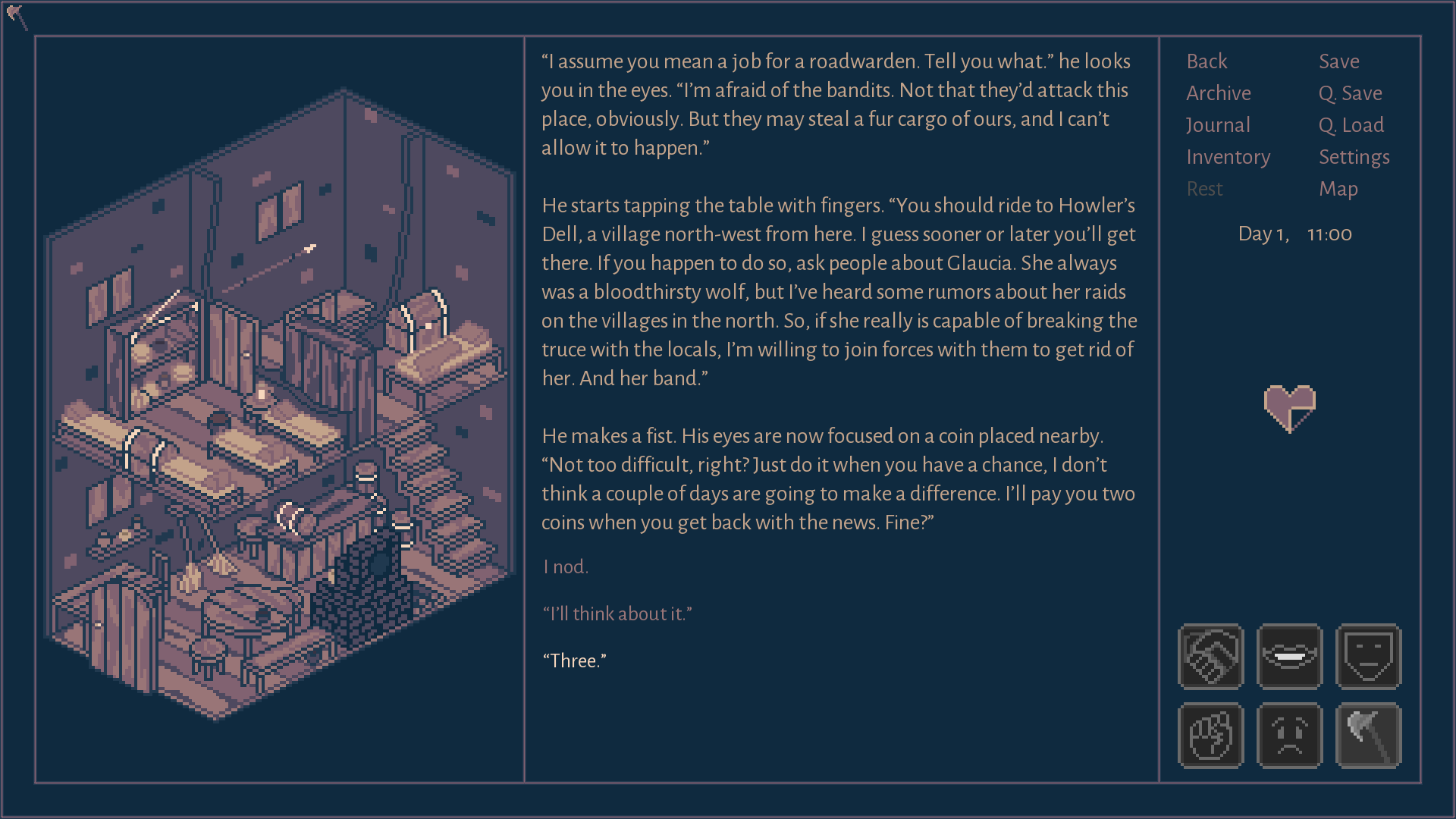
And if the player asks for three coins instead of 2, the game will check the value of innkeeper’s friendliness - the one we’ve influenced during the Attitude phase of the conversation. If this value is higher then 0, the innkeeper will agree to 3 coins. If its equal or smaller, the reward doesn’t change.

Small details such as this one are going to be spread around all of the conversations. I want the player to feel the mood, to see how others perceive you.
The relationship level also shapes the scope of information that player can receive from an NPC. For example, the player can ask for rumors related to specific characters through simple gossip screen, which involves text parsers:
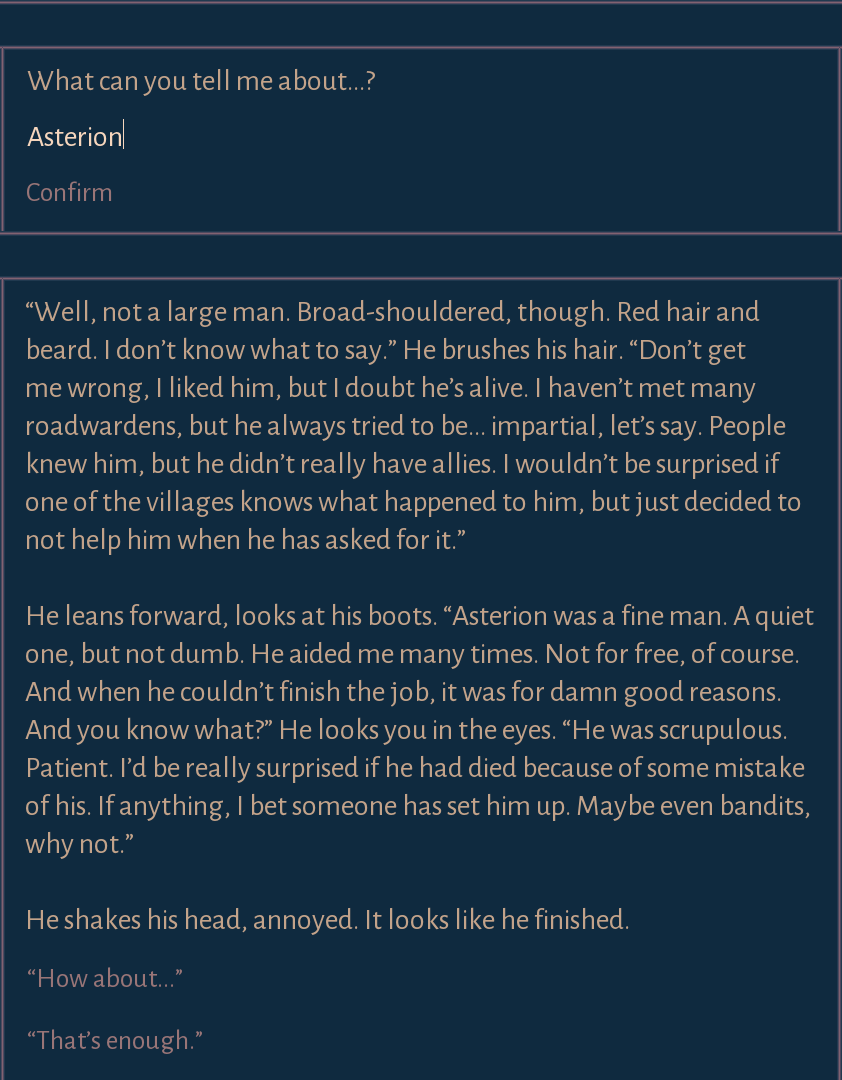
The higher the friendship level is, the more information is going to be revealed. And the most efficient way to increase one’s friendship is to complete quests and make good dialogue decisions. So, it will be necessary to involve some sort of hints like “you know, I feel like we could talk about Asterion some more.” I think it will support the feeling of self-agency and impact that the PC has.
As you’ve possibly noticed, a lot of things that in RPGs are treated marginally, in Roadwarden are a part of the main course. And I have to look for ways to merge the “mood” with the convenience. The shopping is a good example of it.
It’s important to me that buying stuff is seen as something more than a couple of clicks, as a part of the routine. I want to create this illusion of things being a part of the larger world, unique and with their own meaning and purpose. That someone wants you to buy them. So when you use any shop for the first time, you’re met with new dialogue that describes the things that are currently available (currently two, but it’s still WIP):
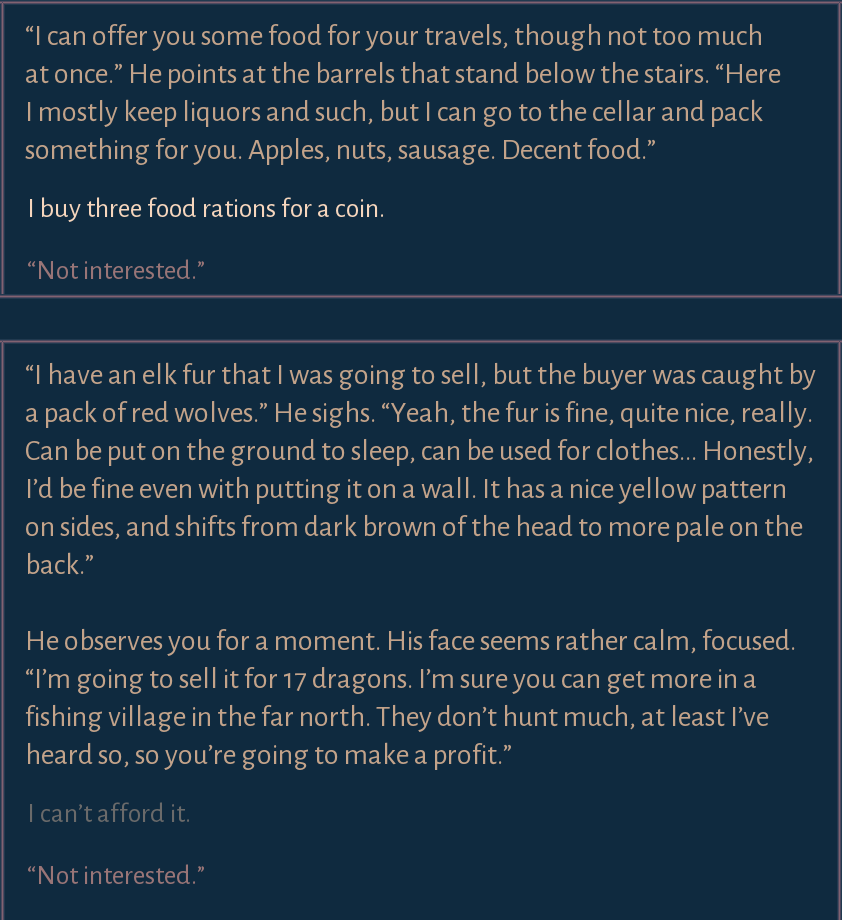
However, you won’t have to see each one of these screens every time you want to buy something. Repeating the same information isn’t fun. So once you see the “stock,” the following visits are going to be smoother and more focused. Oh, by the way - the price of the fur is related to the innkeeper’s friendship level.
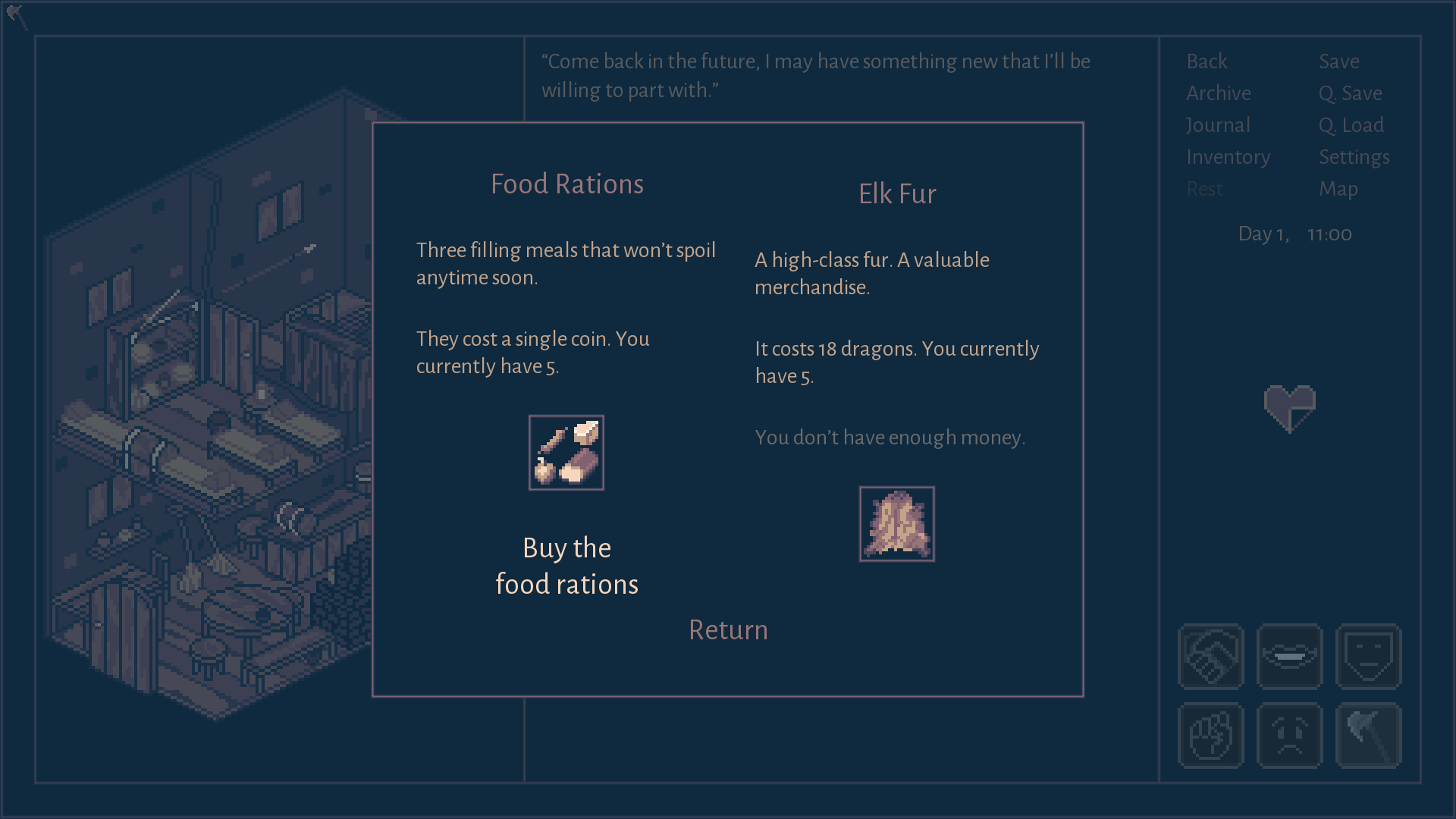
This shop mimics some of the other in-game menus, like the sleeping screen. These menus have to be remade to make them less chaotic, but they are much closer to one-button solutions that will make faster.
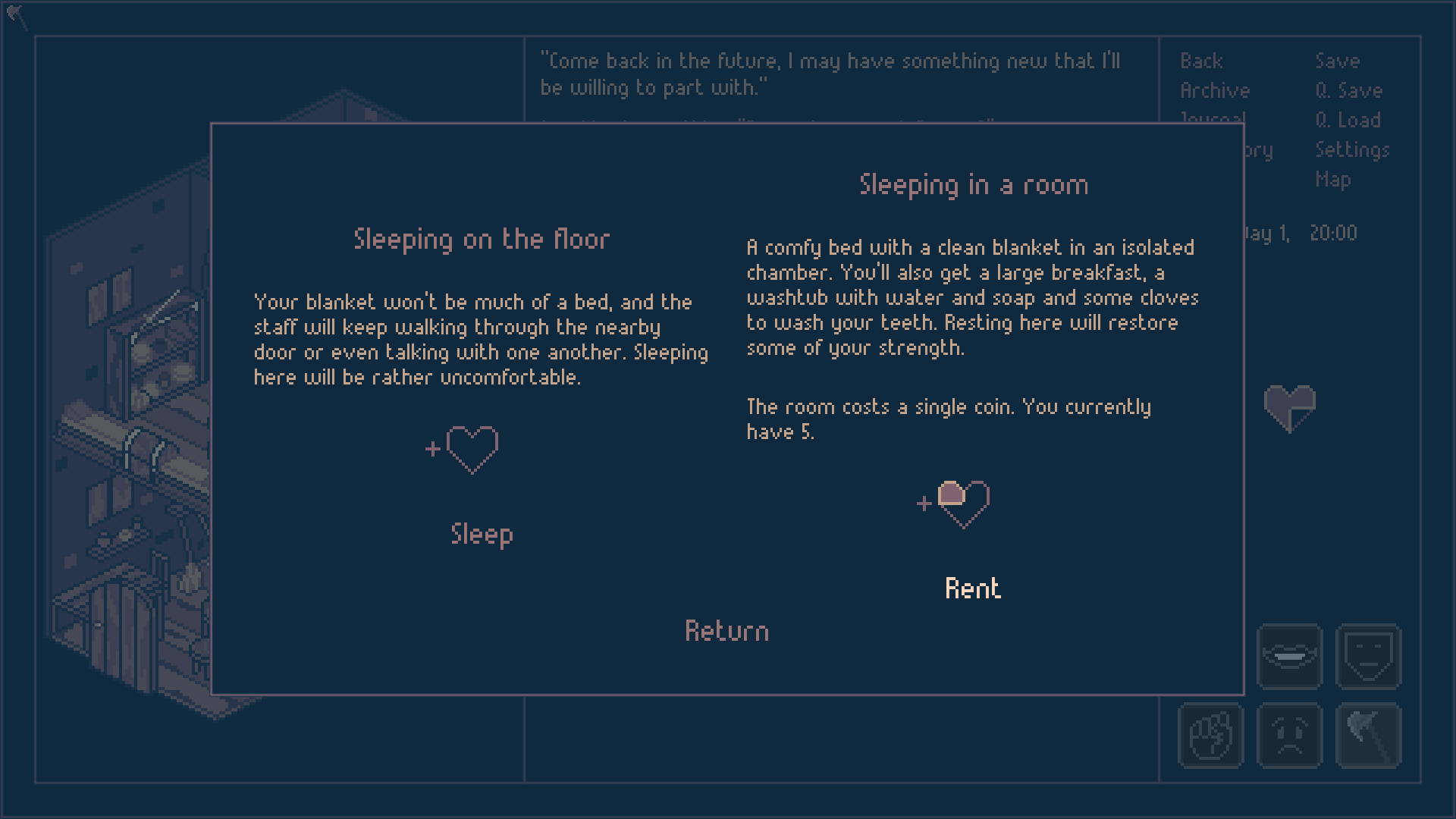
Selling stuff won’t repeat the structure that buying currently has. That’s because more often than not the player won’t have anything worth buying. And if they don’t have anything valuable, it’s still a one-click conversation. It doesn’t need a new menu.
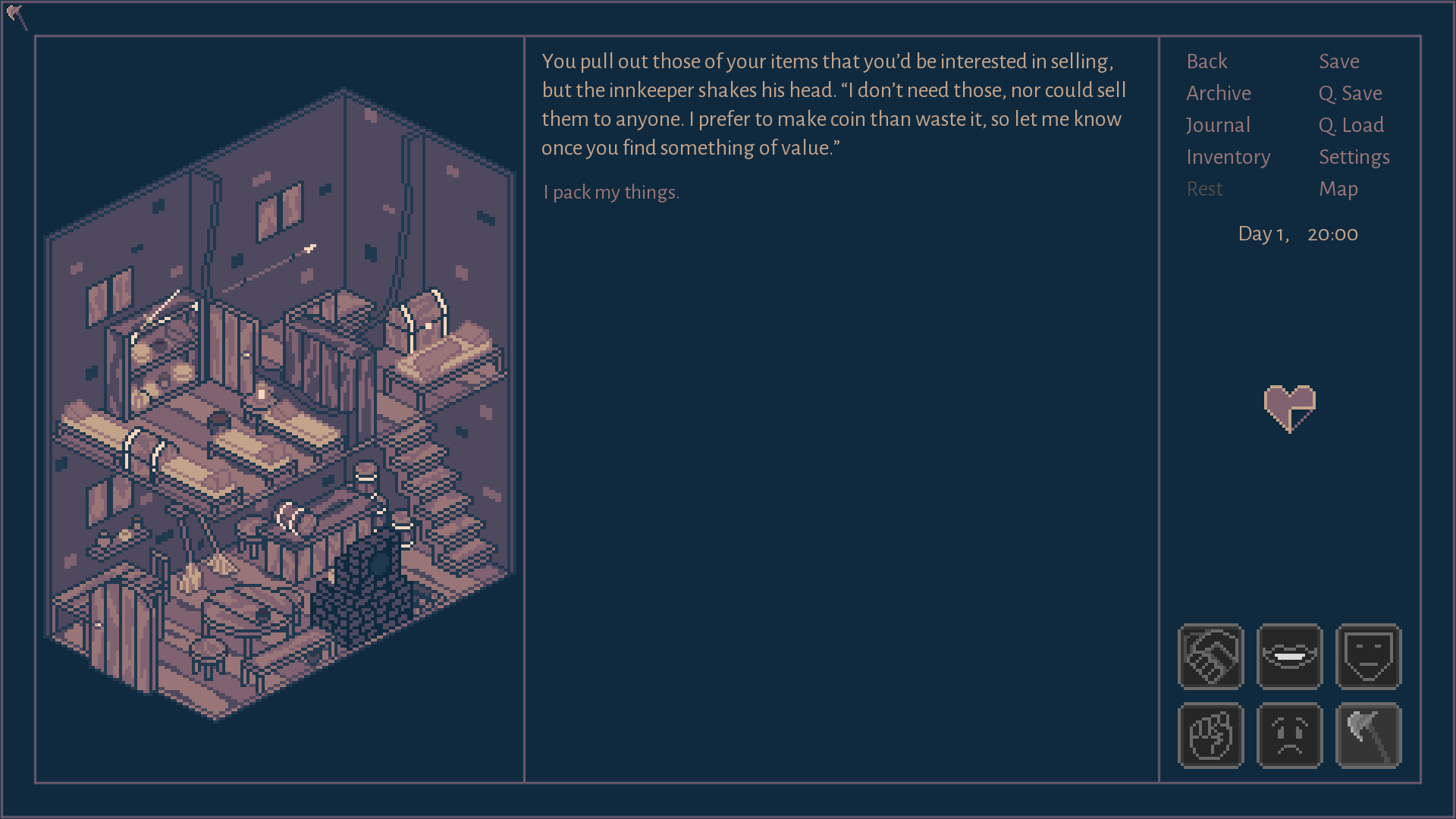
I still haven’t talked about the “leftovers” dialogue branch, but this devlog is already longer than I’ve expected.
I think an important part of Roadwarden is portraying everything as narratively convincing as possible, even though the player is constantly at the center of events. The game doesn’t have a submenu with friendship bars, or “+7, The innkeeper likes it” notifications, or “NPC will remember this” icons. Some decisions and actions are strictly here for the sake of role-playing and don’t change any numbers, while others provide bonuses and disadvantages in such a subtle way that the player won’t be sure if and how the cogs move behind the curtain.
It’s a difficult approach, but one that I’m proud of. I want the experience to cohesively merge the world, the player’s actions and all the mechanical systems - which are implemented to make the story stronger. I want all of it to blend into a sequence of events that makes sense. That feel like a good, massive fantasy tale.

Thank you for your attention. The last week was crazy for me, and I’m happy with the progress I’ve recently made. It feels great to write. Oh, and I'm on Twitter and Facebook.
Get Roadwarden
Roadwarden
An illustrated text-based RPG in which you explore and change a hostile, grim realm.
| Status | Released |
| Publisher | |
| Author | Assemble Entertainment |
| Genre | Role Playing, Adventure, Visual Novel |
| Tags | 2D, Dark, Fantasy, Isometric, Meaningful Choices, Pixel Art |
| Languages | English |
More posts
- The Final UpdateSep 12, 2024
- Roadwarden 1.1.31 AE patch notesSep 18, 2023
- Roadwarden Anniversary UpdateSep 13, 2023
- Roadwarden - Patch 1.0.66Nov 22, 2022
- Roadwarden - Patch 1.0.65Oct 25, 2022
- Roadwarden - Patch 1.0.6Oct 04, 2022
- Roadwarden - Patch 1.0.5Sep 26, 2022
- Roadwarden - Patch 1.0.3Sep 19, 2022
- Roadwarden - Patch 1.0.2Sep 16, 2022
- Roadwarden Released! + The New TrailerSep 12, 2022
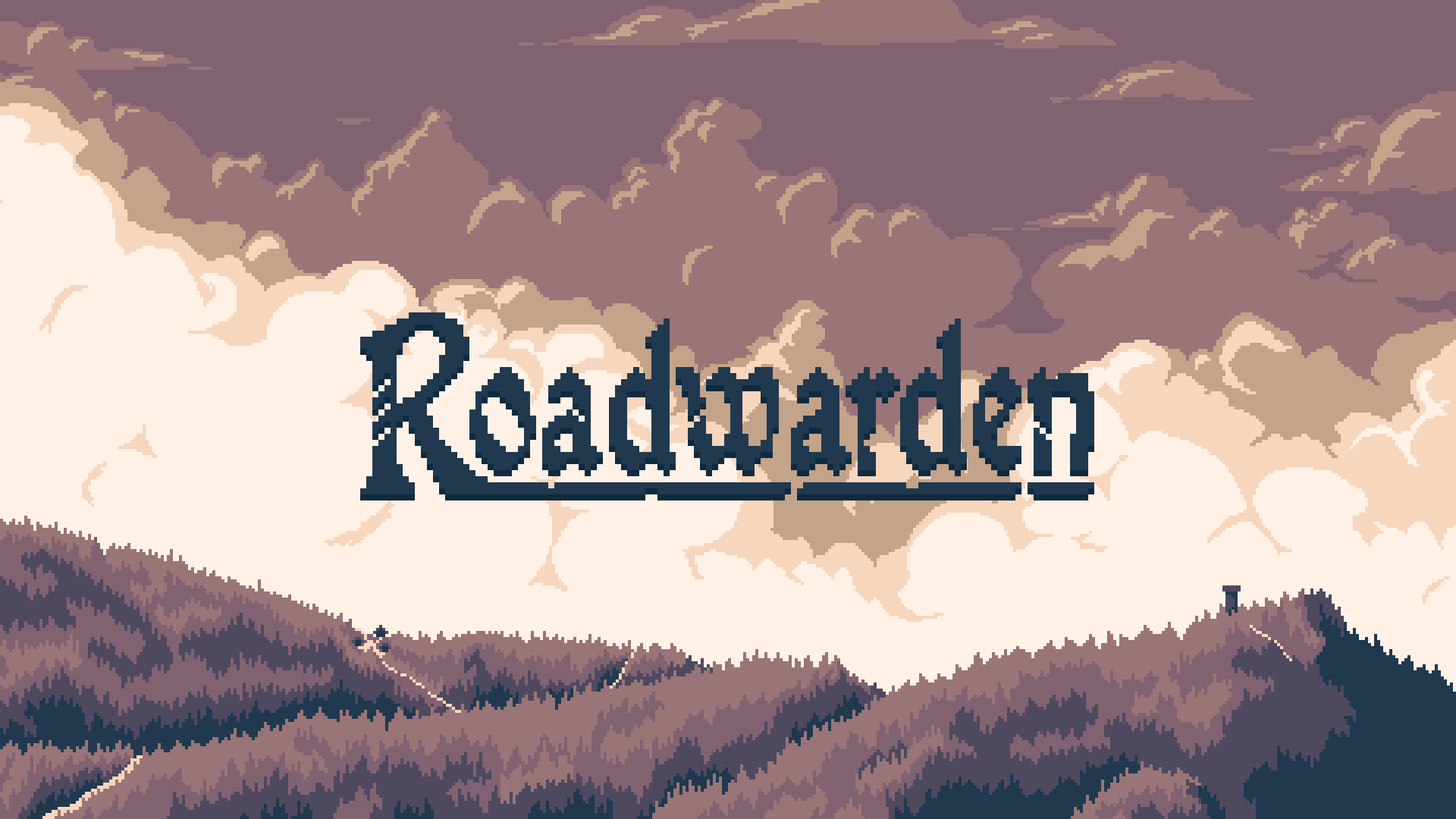
Leave a comment
Log in with itch.io to leave a comment.